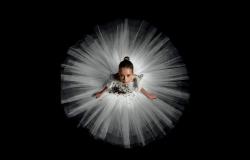Reggio Emilia It takes courage to lay yourself bare and give readers even very intimate aspects of your life. But also generosity, because only an author who practices honest introspection allows others to find pieces of themselves between the pages of his book. Courage and generosity that can be found in “Confiteor”the last work that the writer and journalist from Reggio Emilia Piergiorgio Paterlini has just gone to press for Piemme-Mondadori.
Confiteor, that is, I confess in Latin. In the sense of penitential prayer? Or in the sense that he tells things that he has never written before?
«Religious environments have nothing to do with it, even if they are very present in the book. I confess in the sense of “I tell you things about myself”. I wanted to give a sense of intimacy right from the title and I also think the cover photo contributes to this.”
It is not easy to define what genre this book belongs to.
«I’ll clarify right away; it is not an autobiography. It’s not because I actually left out a lot of key facts about my life. The autobiography is a kind of narrated curriculum. To name just one, I’m not even talking about all my books. If I mention some of them it is to say something about myself, because they are pieces of a journey. I try to tell with facts, not with streams of consciousness, the man I am today and how I became that. It is a method on how a 70 year old person can reread his life, his ethics, his values, his choices, and how and why he made them. In a certain sense, the closest thing we get is a Bildungsroman.”
You define yourself as a man who lived in three different centuries.
«A few years ago, going to schools to talk to kids, I had an intuition. I have been incredibly lucky in my life. In seventy years I have lived three centuries. My first six or seven years, in the peasant world of Castelnovo Sotto, could have been 1880. Then I lived through the entire twentieth century and now a quarter of this new century.”
The pages about his parents strike me. She doesn’t hide anything. The little affection he received from her mother, the harshness with which his father reacted when he learned that he was homosexual…
«In what I tell you there is shamelessness, but there is no ego that is at the centre. I write some, so to speak, “strong” things, but I felt it was essential to do so, given that I chose to write a confession. Sometimes I even struggled to write them.”
In his digging he discovered that he knew nothing about his grandparents, a real black hole in his life.
«It was a shock, because I am a person who believes I am very connected to my roots. Suddenly, while writing the book, I realized that I knew nothing about my family roots.”
There is a lot of Reggio in “Confiteor”. The bookseller Nino Nasi, Pier Vittorio Tondelli, Monsignor Camillo Ruini (who was not very generous with her…), the psychiatrist Giovanni Jervis, Luciano Ligabue, whose books she edited, appear. The Reggio of a few decades ago appears more lively from a cultural point of view than that of today. Can you explain why?
«There was a great vitality. But let’s remember that globalization was already there then. Reggio had that vitality because the world had that vitality and the echoes reached Reggio, even in the seminary that I attended for some years. We breathed the world of the Sixties and Seventies.”
In the end, after experiences in other cities, she chose to stay here. I have to assume there is a strong connection.
«Look, even the civil union with Marco, the first celebrated in Italy in 2016 after the approval of the law, was a gift to Reggio».
A political and civil gesture, of great importance, given that you are the author of “Boys who love boys”.
«We also did it for us, but above all for everyone’s rights. It was meant to be a sign of hope. As for my 1991 book, there will be a new reprint with Einaudi in September: it is undoubtedly my long seller.”
How can we define it politically? Communist? Anarchist?
«If you really want a definition, I like to proudly define myself as anarcho-libertarian. Quoting Camus, if there is a common thread in my life it is the pain for the injustice suffered by others, for inequalities and discrimination.”
The same intolerance that as a reporter for the Gazzetta di Reggio pushed her to put down on paper some homophobic phrases that she had heard uttered by two Rai correspondents. And an uproar broke out. We leave readers the pleasure of knowing the details of the story…
“I agree”.
You were born into a Catholic family and attended seminary until your third year of high school. Religion and God are themes he questions in these pages.
«There is no faith in this book but there is a lot of God, perhaps unexpectedly for those who know me now. God comes back into my definition of a practicing agnostic. He comes back in the many questions I ask myself. He comes back when I deal with quantum physics, with the problem of consciousness, the topics that science and neuroscience in particular study most today.”
At a certain point in its history, books appear. Can we say that they changed and saved her life?
«Books, along with other things, saved me. Books are among the absolute ones that have changed my life. There is a mystery: I don’t know how that passion was born, given the context in which I was born, where there weren’t even one book. However, before seeing a book I already knew that I wanted to be a writer. There are things about me that I don’t understand, this is one of them. A secular miracle.”
There is also sport. She is among the few to have said to Kobe Bryant: “Come on, you go on the pitch.”
«His father Joe played in Reggio and the future Black Mamba was a child. That day Pallacanestro Reggiana was playing badly and I made a joke to Kobe who was in the stands next to me. Beyond this episode, I talk about basketball to explain what he taught me, that is, that in life things can change up until the last minute and you should never give up. He also taught me to see time in a different way. In basketball time is stopped, the fans know how long a minute can last.”
Cycling is another passion.
«I’m talking about a champion, who perhaps isn’t known to everyone today, like Gianni Motta. I write about it to convey a thought: in adolescence it is important to have a myth. It’s one of the things that protects you from pain. The pain of adolescence is a theme that I discussed in “Children” and to which I often return.”
He suffered from panic attacks, yet he came a long way. She didn’t lack the courage to throw herself. How he arrived at “Cuore” is an example.
«I called Michele Serra to propose that I join him and Andrea Aloi in founding the weekly…».
So he left the L’Espresso-Repubblica group and moved to Milan, with very few guarantees.
«The trains go fast. You have to get on the run or nothing. The timeliness of certain choices makes the difference.”
How do you expect “Confiteor” will be received?
«I expect strong reactions, one way or another. Some passages may shock or disturb. But there is one thing I strongly hope for…”.
Which?
«That pushes readers to question their lives and undertake their own introspective journey». L
© ALL RIGHTS RESERVED





